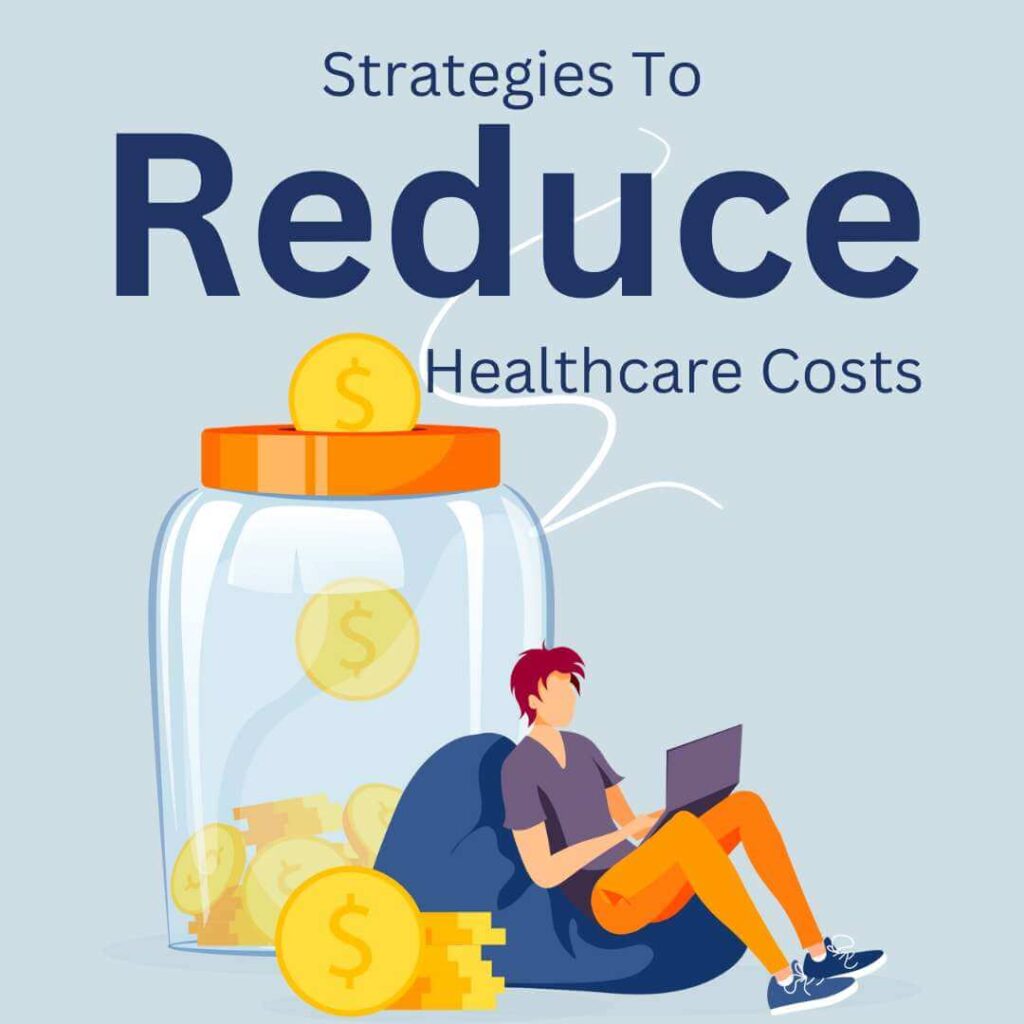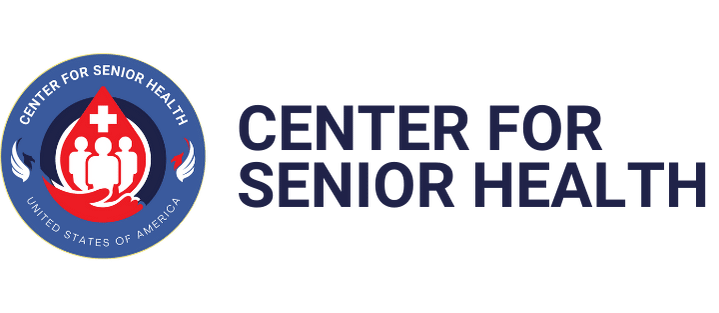Healthcare costs are on the rise, and the impact of high medical expenses can be particularly burdensome for seniors who often rely on fixed incomes during their retirement years. In this article, we share strategies to reduce healthcare costs, alleviate financial stress and improve access to quality care for older adults.

Choose The Right Health Plan
Choosing the right health plan is crucial. Here are some key points to consider:
- Compare different health insurance options: Explore the various insurance options tailored specifically for senior citizens. Consider factors such as premiums, deductibles, and out-of-pocket expenses. Higher premiums mean more coverage, while higher deductibles can reduce costs for those who rarely need medical care
- Assess premiums, coverage limits, and network providers: Evaluate the premiums associated with each option. Consider how these costs fit into your budget while ensuring that the coverage limits meet your anticipated healthcare requirements. Check whether your preferred doctors or hospitals are included within the network providers of the chosen plan.
- Consider Medicare Advantage or Medigap plans: For senior citizens eligible for Medicare benefits, exploring Medicare Advantage (Part C) or Medigap (Supplemental Insurance) plans is worthwhile. Medicare Advantage plans combine hospitalization (Part A), medical services (Part B), and sometimes prescription drug coverage (Part D) into one comprehensive package. Medigap plans work alongside Original Medicare to cover certain out-of-pocket costs, such as deductibles and copayments.
Eliminating Unnecessary Tests and Procedures
Make questioning the necessity of certain diagnostic tests or medical interventions recommended by healthcare providers a habit. This way, you can actively participate in your own care, reducing hospital prices and unnecessary treatments.
- Manage Symptoms At Home: In many cases, certain symptoms can be managed effectively at home with self-care measures. For instance, common ailments like colds, mild headaches, or minor muscle strains may not require immediate medical attention.
- Seek Second Opinions for Uncertain Treatments: Seeking additional input can provide valuable insights into alternative treatment options or confirm the necessity of the suggested intervention. The healthcare system is a commercial one, which is why doctors may not always recommend the most economical solution to your health issue.
- Discuss Alternative Options with Doctors: For instance, red light therapy has shown promise in pain management for certain conditions and may serve as an effective alternative to surgical intervention in some cases. Such non-invasive or less invasive options are of great value and could not only reduce healthcare prices but also minimize the physical burden on patients.
Follow A Proactive Approach To Healthcare
The best value strategies to reduce healthcare costs are holistic strategies for maintaining a healthy lifestyle. This way, patients can minimize the need for expensive medical interventions.
- Vaccinations and regular check-ups: Vaccinations can protect patients from potentially life-threatening illnesses and regular check-ups allow primary care physicians to identify any health issues early on, before they escalate into more serious conditions that require costly treatments. Detecting warning signs of chronic diseases like diabetes or heart disease at an early stage makes the disease more manageable.
- Exercise: Through exercise patients can prevent various chronic conditions such as obesity, diabetes, and cardiovascular diseases. Incorporating exercises like walking, jogging, or cycling into daily routines can have significant long-term benefits for both physical and mental health.
- Proper nutrition: Consuming a balanced diet rich in fruits, vegetables, whole grains, lean proteins, and healthy fats provides essential nutrients while reducing the risk of developing chronic diseases. Avoiding excessive consumption of processed foods, sugary drinks, and unhealthy snacks can help prevent obesity and related health problems.
- Stress management: Chronic stress can contribute to various health issues such as high blood pressure, weakened immune system, and mental health disorders. Engaging in activities that promote relaxation and stress reduction, such as meditation, yoga, or hobbies, can have a positive impact on both physical and mental health.
- Weight management: Obesity is associated with numerous health conditions like diabetes, heart disease, stroke, and certain types of cancer.
- Quit smoking: Smoking is closely linked to a multitude of health issues, such as cardiovascular diseases, respiratory problems, and various forms of cancer, all of which require extensive medical treatment and care. By quitting smoking, patients can lower their risk of developing these costly health conditions.
Use Your Benefits
Maximize the benefits provided by your health insurance plan
Many people overlook or underutilize benefits that come with their health insurance plan, missing out on potential savings.
- Routine health screenings are an essential part of preventive healthcare. These tests can catch potential health problems early on when they may be more easily treated. The good news is that many health insurance plans cover these screenings without requiring a copayment from you.
- Gym memberships: As part of a shift to a more preventive approach to health care, many health insurance plans now offer additional perks such as free gym memberships or discounted fitness programs. These initiatives aim to encourage individuals to adopt healthier lifestyles and prevent chronic illnesses.
- Telehealth services: In non-emergency situations where physical examination is not necessary, telehealth consultations can be a convenient and cost-effective option. Many health insurance plans now cover telehealth services as part of their benefits package.
Health Care Savings Account (HSA) or Flexible Spending Account (FSA)
Another strategy to reduce healthcare costs is to utilize a Health Care Savings Account (HSA) or Flexible Spending Account (FSA). These accounts offer tax advantages and flexibility that can help you save money on medical expenses.
HSAs are owned by you, which means they stay with employees even if they change jobs. Any funds in an HSA can earn interest over time, allowing savings to grow. On the other hand, FSAs are owned by employers and typically must be used within the calendar year.
- Tax advantages: These accounts allow you to set aside pre-tax money specifically for healthcare expenses. By contributing pre-tax dollars to these accounts, you effectively lower your taxable income while simultaneously saving money for future medical needs.
- Coverage: These accounts can cover various eligible healthcare expenses such as deductibles, copayments, prescriptions, and even certain medical procedures. This ensures that you have funds readily available when needed without having to dip into your regular income.
- Contributions: Take advantage of any employer contributions offered for these accounts.
Consider If Going To The Doctor Is Necessary
One of the most effective strategies is to carefully consider if going to the doctor is truly necessary. By evaluating different factors and options, individuals can make informed decisions about seeking medical care, potentially saving both time and money.
Self-Care Measures for Managing Symptoms at Home
In many cases, certain symptoms can be managed effectively at home with self-care measures. Instead of rushing to a clinic or scheduling a doctor’s appointment right away, it is worth considering if the symptoms can be addressed through simple remedies or lifestyle changes. For instance, common ailments like colds, mild headaches, or minor muscle strains may not require immediate medical attention.
By taking a moment to assess the severity of the symptoms and researching reliable online resources for guidance on self-care measures, individuals can often find useful information on how to alleviate their discomfort without visiting a healthcare professional. Nurse helplines are available in some regions as a valuable resource for obtaining advice on minor health concerns. These helplines are staffed by experienced nurses who can provide guidance and reassurance over the phone.
Assessing Symptom Severity Before Scheduling an Appointment
Before making an appointment with a doctor, it is crucial to assess the severity of symptoms. Some conditions may indeed require urgent medical attention; however, others may improve with time or respond well to over-the-counter drugs. By carefully observing and monitoring symptoms over a period of time, individuals can gain insight into whether their condition needs immediate attention or if it might resolve on its own.
For instance, minor injuries such as small cuts or bruises may not necessitate a visit to the doctor’s office if they are healing well and showing signs of improvement. Similarly, common ailments like allergies or mild digestive issues may not always warrant an immediate consultation unless they persist or worsen over time.
Exploring Alternative Options: Telemedicine and Virtual Consultations
In today’s digital age, alternative options such as telemedicine and virtual consultations have gained popularity as convenient and cost-effective alternatives to traditional in-person doctor visits. These options can be particularly useful for non-urgent medical concerns or follow-up appointments.
Telemedicine allows individuals to connect with healthcare professionals remotely through video calls or phone consultations. This approach not only saves time but also eliminates the need for travel expenses and waiting room delays. Many conditions, ranging from routine check-ups to managing chronic conditions, can be effectively addressed through telemedicine.
Virtual consultations provide an opportunity for individuals to seek medical advice from specialists without physically visiting their clinics.
Choose In-Network Health Care Providers
One effective strategy is to choose in-network health care providers. By selecting providers who are part of your insurance network, you can save money and keep your expenses under control. Let’s dive into some key talking points that will help you understand the benefits and options associated with this approach.
Pay Less with In-Network Providers
One of the most significant advantages of opting for in-network providers is the cost savings. These healthcare professionals have a contract with your health plan, which means they charge lower rates compared to out-of-network providers. When you visit an in-network physician or specialist, you pay less for their services, ultimately reducing your overall healthcare expenses.
To ensure you make the most of this cost-saving opportunity, always confirm that specialists, hospitals, and pharmacies are covered by your insurance plan. This step helps prevent any surprises when it comes time to pay for medical services or prescriptions. By staying within your network, you can take advantage of negotiated rates and avoid unnecessary financial strain.
Consider Outpatient Clinics as an Option
If you require a procedure or surgery, consider asking your provider if it can be done at an outpatient clinic instead of a hospital. Often, getting care at a clinic proves to be more affordable than having the same procedure performed in a hospital setting. Outpatient clinics typically have lower overhead costs and fewer administrative fees compared to larger medical institutions.
By choosing an outpatient option, not only can you potentially reduce healthcare costs but also enjoy other benefits such as shorter wait times and more personalized attention from the medical staff. However, keep in mind that not all procedures may be suitable for outpatient settings based on their complexity or potential risks involved.
Avoid Out-of-Network Charges
While staying within your provider network is essential for cost savings, it’s equally crucial to avoid out-of-network charges whenever possible. These charges can significantly increase your healthcare expenses and catch you off guard. To prevent this, always double-check the network status of any providers you plan to visit.
If you find yourself in a situation where an out-of-network provider is necessary, consider reaching out to your insurance company or utilizing commission agencies that specialize in negotiating lower rates with out-of-network providers on your behalf. These services can help minimize the financial impact and ensure you receive the care you need without breaking the bank.
Tips and Tricks
Shop around for prescription medications to find the best prices
One of the most effective strategies is to shop around for prescription medications. Prices can vary significantly between different pharmacies and online retailers, so taking the time to compare prices can lead to substantial savings.
Here are some tips on how to find the best prices for your prescription medications:
Compare prices at different pharmacies: Call or visit various local pharmacies in your area and inquire about the cost of your prescribed medication. You may be surprised by the price differences.
- Explore online options: Many reputable online pharmacies offer competitive prices on a wide range of medications. Make sure to choose a licensed pharmacy and check for customer reviews before making a purchase.
- Consider generic alternatives: Generic drugs are often more affordable than their brand-name counterparts while offering the same active ingredients and effectiveness. Ask your doctor if there is a generic version available for your medication.
- Utilize discount cards or coupons: Some pharmacies offer discount cards or coupons that can help reduce the cost of your prescriptions. Check with your pharmacist or search online for any available discounts.
By taking these steps, you can potentially save significant amounts of money on your necessary medications, helping you manage healthcare costs more effectively.
Request generic drugs whenever possible as they tend to be more affordable
In order to save money on necessary care, it’s important to consider requesting generic drugs whenever possible. Generic drugs contain the same active ingredients as their brand-name counterparts but are typically sold at lower prices due to reduced marketing expenses and patent expiration.
Here’s why opting for generics can help you save money:
- Affordability: Generic drugs tend to be significantly cheaper than their brand-name equivalents because manufacturers don’t have to invest in extensive research and development or marketing campaigns.
- Quality assurance: Generic drugs undergo rigorous testing by regulatory authorities to ensure they meet the same safety and quality standards as brand-name medications. You can have confidence in their effectiveness and safety.
- Insurance coverage: Insurance plans often have lower copayments or cost-sharing for generic drugs, making them even more affordable for patients.
- Wide availability: Generic versions are available for a wide range of medications, including common prescriptions for chronic conditions such as high blood pressure or diabetes.
While there may be instances where brand-name drugs are necessary due to specific medical requirements, discussing generic alternatives with your healthcare provider can help you save money without compromising on the quality of care you receive.
Key Takeaways on Strategies To Reduce Healthcare Costs
In conclusion, reducing healthcare costs requires a proactive approach and careful consideration of your health plan and benefits. By choosing the right health plan, you can ensure that you have coverage for the necessary care while avoiding unnecessary expenses. Eliminating unnecessary tests and procedures is another crucial step in reducing costs as it helps avoid additional charges without compromising your health.
To further save money, be proactive about your healthcare by practicing preventive measures and seeking early treatment when needed. Utilize your benefits fully, whether it’s through a Health Care Savings Account (HSA) or Flexible Spending Account (FSA), to take advantage of tax-free savings for medical expenses. Consider if visiting the doctor is truly necessary for minor ailments that can be managed at home. Telehealth and other health innovations are cost-saving alternatives to in-practice doctor visits.
When seeking care, choose in-network healthcare providers to avoid out-of-network charges. Finally, don’t forget to explore tips and tricks to save money on necessary care such as shopping around for medications or utilizing telehealth services when appropriate. Taking these steps will help you navigate the complex world of healthcare costs and keep more money in your pocket.
FAQs
How can I choose the right health plan?
Choosing the right health plan involves considering factors such as your current health needs, budgetary constraints, network coverage, and prescription drug coverage. Evaluate different plans’ premiums, deductibles, copayments, and out-of-pocket maximums to find one that aligns with your specific requirements.
What are some examples of unnecessary tests and procedures?
Unnecessary tests and procedures may include routine blood work when not medically indicated, excessive imaging scans without clear clinical justification, or redundant screenings for conditions already ruled out. It’s important to have open communication with your healthcare provider to ensure that recommended tests are truly necessary.
How can I be proactive about my healthcare?
Being proactive about healthcare involves adopting healthy lifestyle habits like regular exercise and a balanced diet. It also means scheduling preventive screenings and vaccinations, staying on top of your medication regimen, and seeking early treatment for any health concerns.
What is a Health Care Savings Account (HSA) or Flexible Spending Account (FSA)?
A Health Care Savings Account (HSA) or Flexible Spending Account (FSA) allows you to set aside pre-tax dollars to cover qualified medical expenses. HSAs are typically available to individuals with high-deductible health plans, while FSAs are offered through employers. These accounts provide tax advantages and can help you save money on healthcare costs.
How can I save money on necessary care?
To save money on necessary care, consider shopping around for prescription medications to find the best prices. You can also explore telehealth services that may offer lower-cost consultations for certain conditions. Inquire about generic alternatives for medications and discuss cost-saving options with your healthcare provider.
References
https://medlineplus.gov/ency/patientinstructions/000870.htm
https://www.medicare.gov/health-drug-plans/medigap/basics/how-medigap-works
- Best Red Light Therapy Device 2024 for Pain Management – 16 October 2024
- How To Improve Gut Microbiome – 26 May 2024
- Chemo neuropathy treatment: What to do? – 19 May 2024





